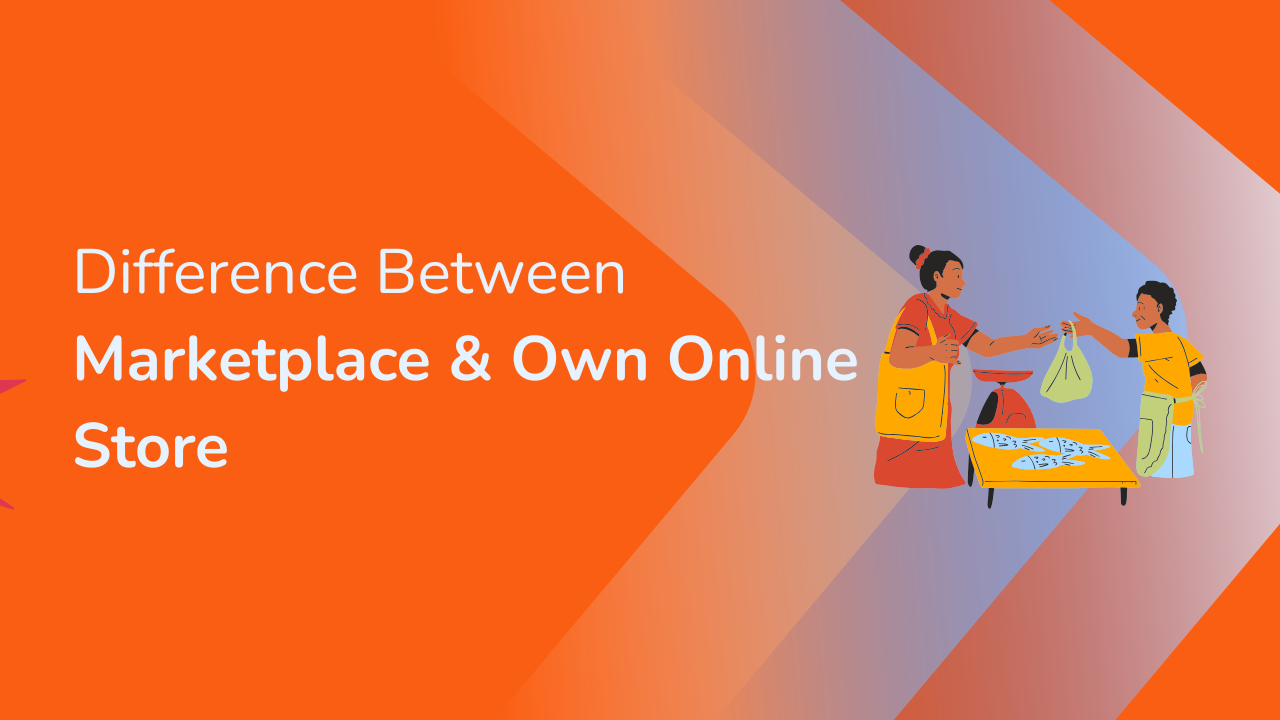Share this Article
Introduction
The e-commerce industry in Nepal has been expanding at a rapid pace, especially in the last decade. Internet penetration, smartphone adoption, and the rise of digital payment platforms such as eSewa, Khalti, and FonePay have transformed the way Nepalis shop. From groceries to electronics, from clothing to household goods, customers today expect the convenience of buying products and services online. For entrepreneurs and businesses, this growing online shopping culture creates both opportunities and challenges. One of the most important decisions that any business entering the digital space in Nepal must make is whether to sell products through an established online marketplace or to create and manage its own online store.
Both models have advantages and disadvantages, and the right choice depends on factors such as business size, budget, technical know-how, brand vision, and target audience. While marketplaces like Daraz, SastoDeal, and Mero Shopping have built trust and large customer bases, owning a dedicated online store through platforms such as Shopify alternatives, custom websites, or local SaaS providers like Saauzi gives businesses more control, flexibility, and branding opportunities.
This article explores the differences between marketplaces and online stores in the Nepali context, analyzing their structures, benefits, drawbacks, and long-term implications for entrepreneurs. By the end, business owners will be better positioned to decide which approach suits their goals in the fast-changing digital economy of Nepal.
Understanding Marketplaces in Nepal
A marketplace is an online platform where multiple sellers list their products to reach buyers. In this model, the platform acts as an intermediary, connecting customers with vendors. Globally, examples include Amazon, eBay, and Alibaba. In Nepal, Daraz is the most prominent player, dominating with its wide selection of products, frequent promotional campaigns, and strong logistics partnerships. Smaller platforms such as Mero Shopping, SastoDeal, and Gyapu have also gained attention, especially among niche buyers.
Marketplaces are attractive to both customers and sellers because they provide convenience and trust. Customers can browse thousands of products in one place, compare prices, read reviews, and often benefit from discounts and offers. Sellers, especially small businesses, can access a ready-made audience without investing heavily in website development, marketing, or payment gateways.
However, selling on a marketplace also means operating under strict rules, paying commissions, and competing with hundreds of other vendors. Sellers often struggle to stand out or to build strong customer loyalty, since most buyers associate their purchase experience with the marketplace brand rather than with the individual business.
Understanding Own Online Store in Nepal
An online store refers to a dedicated e-commerce website or app owned and managed by a single business. Unlike a marketplace, the online store showcases only the products or services of that specific business. Globally, examples include brand-owned websites like Nike.com or Apple.com. In Nepal, many clothing brands, electronics retailers, and service providers now operate their own online stores, either as standalone websites or integrated into social commerce via Facebook, Instagram, and TikTok shops.
Building an online store in Nepal has become easier with the availability of e-commerce solutions such as Saauzi, Shopify, WooCommerce, Magento, and custom-built platforms. These tools allow businesses to create digital storefronts that reflect their branding, control product listings, manage customer databases, and integrate with payment gateways and delivery partners.
The key advantage of an online store is control. Businesses decide how to design their website, how to interact with customers, what promotions to run, and how to collect and use customer data. This ownership creates stronger brand recognition and long-term customer loyalty. However, the challenge lies in attracting traffic, as a standalone online store does not automatically bring customers. Marketing, SEO, and trust-building require continuous investment.
Advantages of Selling on a Marketplace in Nepal
Marketplaces provide an entry point for many businesses. The main benefits include:
- Instant Access to Customers: Platforms like Daraz already have millions of visitors. Sellers can tap into this traffic without spending much on advertising.
- Trust Factor: Marketplaces invest heavily in buyer protection, return policies, and payment security, which helps small businesses gain credibility.
- Logistics and Payment Integration: In Nepal, setting up delivery and payment systems independently can be difficult. Marketplaces simplify this by offering in-built solutions.
- Promotions and Visibility: Marketplace campaigns during Dashain, Tihar, or Black Friday give sellers a chance to reach a wider audience through discounts and advertisements.
- Low Initial Investment: Sellers do not need to spend on web development or branding to start. A product listing and stock are often enough.
Disadvantages of Selling on a Marketplace in Nepal
While marketplaces provide a platform, they also limit sellers in several ways:
- High Competition: Hundreds of sellers may offer the same product. Price wars reduce profit margins.
- Commission Fees: Marketplaces in Nepal typically charge commissions ranging from 5% to 20% per sale, cutting into profits.
- Limited Branding: Customers often remember that they bought from Daraz, not from the specific seller. This reduces long-term customer loyalty.
- Strict Rules and Policies: Marketplaces impose restrictions on product listings, shipping times, and customer communication. Non-compliance can result in account suspension.
- Data Ownership: Sellers rarely have direct access to customer databases, limiting opportunities for remarketing and personalized engagement.
Advantages of Owning an Online Store in Nepal
For businesses serious about long-term growth, having an online store provides powerful benefits:
- Full Control Over Branding: From website design to packaging, every element reflects the brand identity.
- Direct Customer Relationship: Businesses can collect customer data, send personalized offers, and build loyalty programs.
- Higher Profit Margins: Without marketplace commissions, profits are higher per sale.
- Flexibility in Operations: Businesses decide on shipping rules, return policies, and promotional strategies.
- Scalability: Online stores can integrate with CRM, accounting, and inventory systems, making it easier to manage larger operations.
- Global Reach: Nepali businesses can sell not only locally but also internationally, especially if they integrate international payment gateways and logistics.
Disadvantages of Owning an Online Store in Nepal
Running an online store also has challenges, particularly in the Nepali context:
- Initial Setup Costs: Building a professional website requires investment in design, hosting, domain, and e-commerce solutions.
- Marketing Expenses: Without a marketplace, businesses must run ads, SEO campaigns, and social media promotions to attract traffic.
- Trust-Building: Many Nepali consumers are still skeptical about new websites. Establishing credibility takes time.
- Logistics Management: Unlike marketplaces, businesses must arrange delivery partners themselves. While companies like Pathao, Delhivery, and Sundar Nepal provide solutions, integration is not always seamless.
- Technical Maintenance: Websites require regular updates, bug fixes, and customer support systems. Without technical expertise, this can be challenging.
Key Differences Between Marketplace and Online Store in Nepal
The core differences can be summarized as follows:
- Ownership: Marketplaces are shared platforms, while online stores are fully owned by one business.
- Customer Relationship: Marketplaces keep customer data; online stores allow direct access.
- Brand Identity: Marketplaces limit visibility of the seller’s brand, while online stores highlight it.
- Cost Structure: Marketplaces charge commissions; online stores require upfront investment but offer better long-term margins.
- Scalability: Online stores provide greater flexibility for growth, while marketplaces limit customization.
- Marketing Dependency: Marketplaces bring traffic; online stores require independent marketing efforts.
Real-Life Examples from Nepal
- Daraz Marketplace Sellers: Many small businesses start on Daraz to test demand. For example, a home-based clothing seller can list products and immediately gain visibility. However, without strong branding, customers often forget the seller and return only to Daraz.
- Independent Online Stores: Brands like Goldstar Shoes and UG Bazaar run their own websites. These businesses invest in digital marketing and have built strong brand recognition. Customers remember the brand, not just the platform.
- Hybrid Approach: Some businesses operate on both models. They use Daraz to gain initial sales but also build their own online store to establish long-term customer loyalty. This dual strategy is increasingly common in Nepal.
Future of E-commerce in Nepal
The future of e-commerce in Nepal will likely combine both models. Marketplaces will remain powerful entry points for businesses and trusted platforms for customers. However, as digital literacy, payment systems, and logistics improve, more Nepali businesses will shift towards building their own online stores to establish independence and long-term value.
The rise of SaaS platforms like Saauzi indicates that the Nepali market is ready for user-friendly, affordable tools that empower small businesses to go online without depending entirely on global or regional marketplaces. Government policies, improved banking systems, and investments in logistics infrastructure will further accelerate this transformation.
Conclusion
Choosing between selling on a marketplace and owning an online store is one of the most important strategic decisions for Nepali businesses entering e-commerce. Marketplaces offer convenience, trust, and access to ready customers, making them ideal for beginners. However, they come with restrictions, commissions, and limited branding opportunities. Online stores, on the other hand, require investment and effort but provide long-term benefits such as brand identity, direct customer relationships, and higher profitability.
In Nepal, the ideal strategy for many businesses may be a combination of both: starting on marketplaces to test the waters and gradually building an independent online store for sustainable growth. Ultimately, the right choice depends on the business vision, resources, and commitment to digital transformation.
Categories:
Platform Comparisons
Tags:
Online Store in Nepal
,
local businesses
,
e-commerce app
,
Small Business
,
E-commerce







